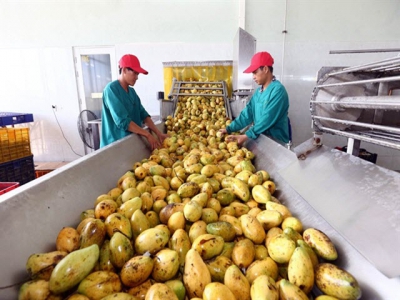Agricultural export value up 2% in first seven months of 2019

HÀ NỘI – The agricultural sector gained US$23.03 billion from farming, forestry and fishery exports in the first seven months of this year, a year-on-year increase of 2 per cent, according to the Ministry of Agriculture and Rural Development (MARD). The figure includes $3.55 billion of exports in July.
An export processing line for fruit at the Nafoods company. The agricultural sector gained US$23.03 billion from farming, forestry and fishery exports in the first seven months of this year. VNA/VNS Photo Danh Lam
Major farm produce shipped overseas brought home $10.84 billion, with five billion-dollar categories including coffee ($1.8 billion), rubber ($1.1 billion), rice ($1.73 billion), cashews (nearly $1.8 billion) and fruits and vegetables ($2.3 billion).
However, the ministry said the total export value of the major agricultural products fell 8.2 per cent year on year due to a drop in several products like cashews (20.6 per cent), pepper (25.2 per cent), coffee (12 per cent) and rice (16 per cent).
The export prices of two main seafood exports, tra fish and shrimp, also dropped 3.2 per cent and 10.4 per cent to $1.16 billion and $1.73 billion, respectively, causing the total export value of seafood products to drop 1 per cent to $4.68 billion.
From January to July, shipments of the main forestry products earned the country about $6 billion, up 17.3 per cent year on year. This included $5.6 billion from wood and wooden products, up 16.1 per cent, and $264 million from bamboo and rattan products, soaring 46.6 per cent.
The ministry said global economic growth was projected to slow while agricultural development will bounce back in many countries. This combination of factors would pose a challenge to the country's forestry exports.
Fierce competition would pull prices of exports down. Large importers of Vietnamese goods like the US, the EU, China, Japan and the Republic of Korea (RoK) had imposed strict standards on quality management, food safety and origin traceability.
The ministry would work with businesses and associations to keep a close watch on the development of international markets and increase inspections to prevent smuggling.
Besides co-ordinating with ministries and sectors to stabilise traditional export markets and expand into new ones, helping reduce dependence on single country, the ministry would give production guidance to localities to ensure their products meet importers’ traceability requirements.
Attention would also be paid to developing brands for agricultural products, particularly those exported to the Chinese market, while authorities would set up a co-ordination mechanism with the Chinese General Administration of Customs to remove bottlenecks in agricultural trade between the two countries.
Fruit, vegetable exports
The ministry also reported the vegetable and fruit industry, which showed strong export growth in recent months, nevertheless post a slight reduction in export value in the first seven months of the year, down 0.8 per cent year on year to $2.3 billion, including $269 million in July.
China was the biggest importer of Vietnamese vegetables and fruits with nearly $1.5 billion, up 1.1 per cent year on year, accounting for 71.9 per cent of the market share. It was followed by the US ($70.2 million) and the RoK ($65.3 million).
Impressive growth was seen in exports of fruits and vegetables to Cameroon (up 10.16 times), the Dominican Republic (up 8.37 times) and Guam (5.11 times).
The Agro Processing and Market Development Department said the sector would have more chances to expand its export markets thanks to the Comprehensive and Progressive Agreement for Trans-Pacific Partnership (CPTPP) and the recently signed EU-Vietnam Free Trade Agreement (EVFTA).
The department advised businesses study the opportunities and challenges of the European market and markets of the 10 CPTPP member states and improve the quality of their products.
Có thể bạn quan tâm
 Local fruit strives to win back domestic market
Local fruit strives to win back domestic market The total value of Vietnamese fruit market is estimated at 20 to 30 billion USD. However, this thriving market seems to be neglected by agro firms
 Seven-month rice export up in volume, but down in value
Seven-month rice export up in volume, but down in value Vietnam exported 4.01 million tonnes of rice worth 1.73 billion USD in the first seven months of 2019, up 2.1 percent in volume but down 14.3 percent in value
 Production linkage facilitates sale, increases value of agricultural products
Production linkage facilitates sale, increases value of agricultural products Bac Giang province has applied a mechanism to encourage production under value chains to facilitate sale and increase the value of agricultural products